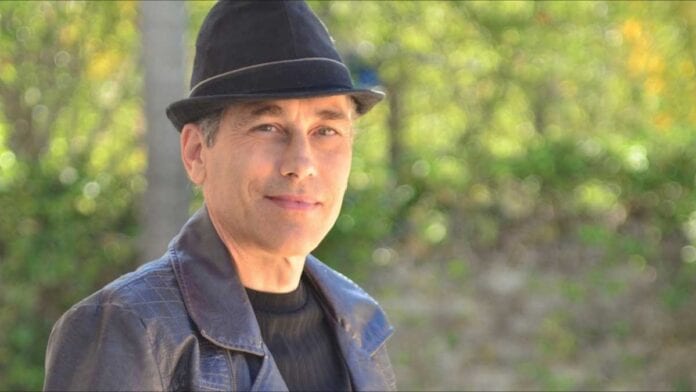Serenata’s subtitle tells the story: Piano Impressions of Milton Nascimento, Clube da Esquina and Dori Caymmi.
10 Questions with Gregg Karukas poses another thought:
Could Serenata contend for top honors in 2021?
With Serenata, Gregg Karukas reaches a trio of musical milestones: His first album in six years. His first solo piano album, his first collection for New Age listeners, and his first homage to Brazilian music.
Spanning 15 titles – with half being Karukas originals – Serenata is at once powerful and intimate. Even the softest passages in Serenata reflect the passion and vitality that Milton Nascimento and Dori Caymmi bring to their originals.
We caught up with the Grammy-winning pianist, songwriter and producer recently, where the conversation turned to concept and creativity, personal reflection, and the healing power of music.
Responses to our 10 questions with Gregg Karukas were edited for clarity and context.
10 Questions with Gregg Karukas
Serenata is an impressive album, but why did you choose Brazilian music?
I’m thankful for all of my varied musical experiences that keep things challenging and fun, and it is quite a full-circle moment for me to do an entire album that is at least half Brazilian compositions.
2021 marks my 30th year with Brazilian music and Serenata has given me the opportunity to record my personal versions of many of the Brazilian songs I love. Almost every one of my 12 smooth jazz albums has at least one song that has a Brazilian vibe to it.
I have very wide musical interests and I should mention that of all the labels that I’ve been on in my career, there was never any pressure to do any one type of song or style. I always made the music I wanted to make and delivered it. Now that I have my own label it’s the same situation and I don’t think I would have it any other way.
Did you approach Serenata with your usual creative process?
My composing process is always one where I’m thinking about melody and how chord changes and harmonies can lead to the next line.
Having played so many of Dori Caymmi‘s songs while touring with him I had a good understanding of his harmonic concepts, and strangely enough, some of my own earlier songs had some of the same chords!
We are all living through challenging times. Was Serenata personally cathartic for you?
It’s been a great story to get reacquainted with the acoustic piano because I had really been on about a five-year hiatus.
My wife Yvonne had been diagnosed with two different types of cancer, so all of our energies were devoted to her health, and I was not looking to spend time in the studio writing and recording.
After she passed away in 2018, I was still not very inspired to tackle a big original project, but I had faith things would eventually evolve to find new melodies and sounds.
One of my favorite musical associations of all time is with Dori Caymmi and after my recent move I came across a box of cassette recordings from the 90s. One particular tape was labeled Dori – Le Café, and I had marked it with a star.
Just seeing it brought back a rush of memories from the shows we had done together at Le Café in Los Angeles. So, I popped the tape into a cassette player.
Listening to that cassette from the past got me very emotional and it reconnected me with that period of my life. I had proposed to Yvonne on the beach while we were performing with Dori in San Diego. Later, Dori was part of our wedding ceremony in 1992 where he sang his most famous song ‘O Cantador’ (Like a Lover).
So, with all of these memories fresh in my mind, I sat down at the piano and began to recall Dori’s great melody, the one he played for us on our wedding day.
Then, I started to remember some of his other lush, romantic songs that we played. This turned into the inspiration for Serenata.
READ MORE ABOUT SERENATA AND GREGG KARUKAS
- Gregg Karukas Serenata Preview
- Gregg Karukas Serenata Review Roundup
- Upcoming Events for Gregg Karukas
- Press Release: Serenata by Gregg Karukas

The healing power of music has never been more appreciated than during the pandemic. What would you say to New Age music fans who are being introduced to Serenata for the first time?
New Age fans, I would welcome you by saying this: You will discover some great compositions, and melodies that will lift your spirit. And I hope Serenata leads you to other iconic songs from Milton Nascimento and Dori Caymmi. You may find your new favorite music, just like I did 45 years ago.
You won a Grammy for your New Age collaboration with Omar Akram on Echos of Love in 2013 and previously worked with pianist David Lanz. Did these experiences open your eyes to the possibilities of a solo piano project?
Well, for me, producing and arranging for other piano players was a perfect way to approach the piano in a different way than I had been on my solo projects up to that point.
It was my work with David that led to getting a call from, then unknown, Omar, since David was one of his heroes. Omar then got signed to a label based on the first tracks I produced and arranged.
Winning the Grammy for my New Age work with Omar was quite a surprise and personally gratifying.
I had produced and arranged three of his albums over a ten-year period, and in that case, my creative input was much greater, having composed, arranged and played many of the original piano parts – all the grooves, starting from nothing. As a last step to complete the Echoes of Love project, Omar copied my piano parts.
I still have lots of left over song ideas from that period that, hopefully, will make a future GK “world music” project.
How did Serenata bring you in touch with the unique aspects of the intimacy of the solo piano?
In some ways, Serenata was a big challenge for me, because playing solo piano is not something that I ever did professionally. My background is not as a classical player, but more as a self-taught jazz player. I concentrated on playing with rhythm sections.
But, as challenging as it is to play just solo, once I got comfortable, I found it very stimulating and inspiring, because of the freedom to concentrate on the great melodies, but also have the underlying parts be rich and sophisticated without sounding too busy or flourished.
Some might think that “solo piano” means sleepy music, but it’s not. Serenata is engaging and thoughtful. “Relaxing” and “romantic” are two comments that I’ve gotten a lot.
I’m known as a multi-keyboard, synthesizer, and ensemble player, but with the pandemic, that was just the perfect opportunity to develop my solo chops and re-discover these great songs as romantic piano arrangements.
The response to Serenata has been great, and I love that it is giving people some respite and relief during our isolation.
It’s always interesting to learn more about the lives of people when they are away from their profession. How would you describe your lifestyle and what is a typical day in your life like?
Well, I am enjoying practicing piano! I am a movie buff and an avid reader, mostly music and film biographies and memoirs.
I love hiking in nature while in “lockdown.” Every evening is a sunset show at my house, as I have a great view from my backyard looking west. My area has great mountain biking trails, but I broke my collar bone on a very steep downhill a few years ago, so now that I’m alone, I don’t go too crazy on the trails.
I love the beach too, and I’m lucky that it is only a 35-minute drive to the ocean. On clear days, I can see Santa Cruz Island. One of my favorite activities is cruising around the marina and beach areas of Ventura, California on my e-bike, watching the surfers.
I’ve done my share of touring over the decades, so it is good to not be going through airports every weekend, too.
You have spoken of Native Dancer and a local Chef who loaned you Brazilian albums to listen to. Were those your earliest memories of Brazilian music?
My parents had Antonio Carlos Jobim’s Wave album and I was playing the standard Bossa Nova tunes on lounge and jazz gigs as a teenager.
I was lucky to become friends with Mitch Rubin, the cook at Harold’s Rogue and Jar, the jazz club in Washington, DC. Mitch had lived in Brazil and he let me borrow a stack of classic MPB LP’s from Milton Nascimento, the classic Clube da Esquina albums, Edu Lobo, João Bosco, Chico Buarque, to name a few. I copied them all to cassettes and I still have them.
Charlie Byrd was from DC, so I was aware of his historic Jazz Samba album with Stan Getz and, of course, Chick Corea’s Light as Feather. But hearing George Duke’s Brazilian Love Affair and Wayne Shorter’s Native Dancer were big inspirations.
What’s next for Serenata?
Well, when I began Serenata, I tried to come up with my own style, being that solo piano was a new challenge. I kept many of the first takes, to keep the original vibe.
Now that it is done, I’ve been “re-learning” the songs and am already recording videos on the C7 grand in my living room, I’ll be releasing them soon, and here’s a spoiler alert: I’m expanding Serenata’s songs a bit during these live recordings!
Serenata has given me another revelation: My playing has gotten so much more fluid. I have more confidence in the idea of doing a whole solo concert, including a few of my “hit” songs with track backgrounds, but all with a grand piano.
A livestream or two may be in the works, too. As for live venues, I’m looking forward to doing more intimate solo shows wherever they’ll have me. When I do my Gregg Karukas Group tours, I’ll have an expanded solo segment, which will be especially cool if there is a grand piano available. I hope to see you there.
I’d love to do another solo piano CD, with more great Brazilian interpretations and originals, and more projects with my Brazilian friends, too.
You’ve spoken about the idea of Brazilian music as an “antidote.” What are your thoughts and hopes for the messages this music shares with listeners?
Well, it is my hope that Serenata will bring some measure of peace and joy to all who are suffering during this challenging time, just as it has for me while creating it.
At first, Serenata might surprise fans of my earlier albums because I have always tried to write and play the “sound of emotion” and I’ve found that Serenata’s intimate solo piano setting just gets me closer to the heart of the music.
While I can never claim to be on the same musical level as my piano heroes, I want to humbly pay tribute to the artists and songs that have meant so much to me for decades.
10 Questions with Gregg Karukas
- Visit Gregg Karukas’s website
- Get a signed copy of Serenata
- Browse his recordings
- Join Gregg’s mailing list
- Read his Bio
- Read Serenata reviews
Follow Gregg Karukas on
Facebook | YouTube | Instagram | Twitter
Amazon | Apple Music | Pandora | Spotify | Deezer | Gregg Karukas store
Stories like ’10 Questions with Gregg Karukas’ are what we do. Why don’t you join us?
- Sign up for our emails on music, travel, friends and fun. Listen to our ‘always live’ streaming station and our 12 streaming music channels, always free. Browse our Lifestyle Directory. Click here to like our Facebook page and here for Brazilian events coast to coast.









